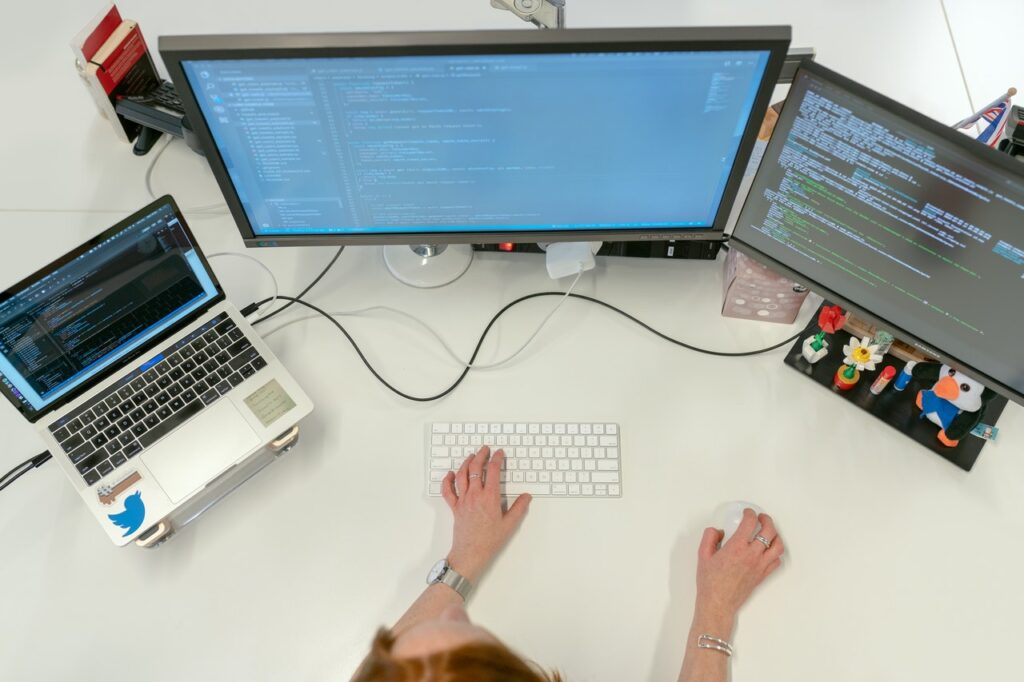Do you know what the role of a mechanical engineer in the computer field is? Are you considering migrating to the field of electronics and software?Find out all you need to know about mechanical engineers that have chosen to take their career path towards computer engineering and science.
Mechanical Engineer
Mechanical engineering is one of the broadest of all engineering disciplines, traditionally encompassing three primary sub-fields: mechanisms and machinery, energy, and manufacturing. Although its primary purpose could be described as creating and improving machines to benefit mankind, this fundamental task engages the mechanical engineer in a vast array of fascinating specialty areas.
Mechanical engineers use energy principles and mechanics to design a wide variety of devices, machines, and systems, including complex human-machine systems, for energy conversion, environmental control, bio-fuel production, environmental control, materials processing, transportation, materials handling, and other purposes. They may develop robots for space exploration, use a computer to simulate the freezing of human cells, or improve devices for use of alternative energy sources, such as fuel cells, wind turbines, and solar energy converters.

Aspiring mechanical engineers must earn a bachelor’s degree in mechanical engineering at a minimum, and may pursue graduate degrees in the field. Every state requires that mechanical engineers earn licensure, which calls for education, supervised work experience, and several examinations.
Computer Engineer
Computer engineering (CpE) is a branch of engineering that integrates several fields of computer science and electronic engineering required to focus on the design and implementation of computer systems (logic devices and software).
Computer engineers evaluate, design, and maintain computer hardware and software systems. They develop, test, and design, computer processors, circuit boards, and network systems. They resolve problems or address any concerns that occur with the hardware or software and aid in the advancement of computer technology.
Computer engineers are involved in many hardware and software aspects of computing, from the design of individual micro-controllers, microprocessors, personal computers, and supercomputers, to circuit design. This field of engineering not only focuses on how computer systems themselves work but also how they integrate into the larger picture.

Computer engineering is referred to as computer science and engineering at some universities. Most entry-level computer engineering jobs require at least a bachelor’s degree in computer engineering (or computer science and engineering). Typically one must learn an array of mathematics such as calculus, algebra and trigonometry and some computer science classes. Sometimes a degree in electronic engineering is accepted, due to the similarity of the two fields. Because hardware engineers commonly work with computer software systems, a strong background in computer programming is necessary.
Mechanical & Computer Engineer Education
Mechanical Engineering
There are many different sub-categories for mechanical engineering education. Many mechanical engineers decide to choose the more general mechanical engineering degree to start with, particularly for their undergraduate/bachelor’s studies. Some decide to stick with a mechanical engineering degree for their master’s degree, but most (not all) that end up getting their Ph.D., or doctorate degree, end up specializing in one of the below categories.
Unlike mechanical engineering technology programs, which focus most on theory, mechanical engineering programs focus on practical application. Students should not confuse engineering programs with engineering technology programs. Engineers complete engineering degree programs while engineering technicians or technologists complete engineering technology programs, which are usually associate degree programs.
Although mechanical engineers must have at least bachelor’s degrees, those who wish to work in management, as teachers or in research and development generally complete graduate programs. Some colleges, such as Purdue University, offer five-year or six-programs that allow the student to earn both a bachelor and master’s degree. After five years of study, the graduate will have a Bachelor of Science in Mechanical Engineering as well as a Master of Science in Mechanical Engineering.
The five and six-year programs commonly offer cooperative education programs as well. Many colleges offer students scholarships through their engineering departments as well as opportunities to become members of their engineering organizations.

Computer Engineering
The minimum requirement for hardware and software engineers is a bachelor’s degree. Employers prefer job candidates who have experience with various computer systems, according to the U.S. Bureau of Labor Statistics (BLS). Some hardware engineers qualify for positions with a bachelor’s degree in electrical engineering and experience with computer systems. Software engineers may complete a degree program in computer science, engineering or programming to qualify for a job in the field. A computer software engineer should have knowledge of a variety of programming languages. Computer engineering programs include courses in computer hardware, computer organization, data analysis, science and advanced mathematics.
Some employers prefer a computer engineer with a graduate degree in engineering or business administration, according to the BLS. Graduate degrees in computer engineering may also qualify you for senior engineering positions. Master’s degree programs include software and hardware engineering courses. A master’s degree program might require the student to complete a research project to fulfill the requirements of the degree.
Taking an internship under the supervision of an experienced computer engineering professional is the best way to learn the skills and technical applications needed to be a computer engineer. Many internship programs are available for college credit in any given major. Internships offer hands-on experience to likewise inexperienced amateurs in the field. Most employers will not hire a computer engineer who does not have some relevant experience.
Mechanical & Computer Engineer Job Description
Mechanical Engineer
Mechanical engineers research, design, develop, build, and test mechanical and thermal sensors and devices, including tools, engines, and machines.
They design power-producing machines, such as electric generators, internal combustion engines, and steam and gas turbines, as well as power-using machines, such as refrigeration and air-conditioning systems.
Mechanical engineers design other machines inside buildings, such as elevators and escalators. They also design material-handling systems, such as conveyor systems and automated transfer stations.
Like other engineers, mechanical engineers use computers extensively. Mechanical engineers are routinely responsible for the integration of sensors, controllers, and machinery. Computer technology helps mechanical engineers create and analyze designs, run simulations and test how a machine is likely to work, interact with connected systems, and generate specifications for parts.
Some job responsibilities of a mechanical engineer include:
- Coordinate with Engineers and CAD Designers for prototype and pilot detailed design
- Conduct tolerance analysis at system and subsystem level
- Conduct engineering tasks and work efficiently
- Design component layout for new or improved mechanical subsystems
- Generate system concepts to satisfy product requirements
- Handle purchase requisitions, purchase change orders and requests for quotes to suppliers
- Interface with development engineers, scientists and suppliers to resolve quality issues
- Suggest cost saving proposals on make-versus-buy analysis or alternative sourcing
- Verify concepts through breadboard builds and analysis
Computer Engineer
Computer hardware and software engineers work in manufacturing, computer design firms or for government agencies developing computer systems and applications. While engineers may specialize in software applications or hardware systems, computer engineering education programs include coursework in both areas. The computer field advances rapidly, requiring engineers to continue their studies throughout their careers.
Computer engineers manage and design the computer hardware and software systems of a company. These skilled individuals may specialize in hardware or software and are often referred to as programmers. Their duties include developing software systems, updating hardware, and designing new equipment.
Some job responsibilities of a computer engineer include:
- Build Windows virtual machines in VMWare and on-premise environments
- Conduct regular hardware testing using available technology and testing tools
- Deliver agreed upon IT system solutions in a timely manner
- Design and oversee the production of computer hardware equipment as needed
- Develop a plan for identifying and isolating hardware defects
- Perform validation testing for new and rebuilt motherboards
- Update existing computer equipment and integrate new technology into existing units
- Verify that the proposed final product follows best practices for enterprise systems is within cost guidelines and meets required specifications

Mechanical Engineer in the Computer Field
Mechanical and computer engineering both involve the design, development, and testing of tools for public use. Each of these professionals works to identify and solve problems using systems, modeling, and mathematics. Mechanical and computer engineering are each rooted in science and mathematics, and both require the ability to communicate complex ideas.
Mechanical engineers use computer science and technology to analyze and design subsystems, as well as to develop and test their prototypes. Those with skills in the latest software tools, such as 3-D printing, can even eliminate the need for prototypes, moving a project from concept to final product more quickly.
Mechanical engineers use nanotechnology to build the ever smaller and more capable computer chips upon which computer scientists rely. A mechanical engineer in the computer field would help develop the computer programs and processes that allow mechanical engineers to analyze important data and conduct analyses.
Specifically, a mechanical engineer in the computer field would be involved in designing and testing robots, helping to set up and test networks, perform routine checks to ensure hardware and systems are stable and operating efficiently among many other responsibilities. It is also advised for mechanical engineers to stay up to date on industry trends and technologies in order to ensure the organization is taking advantage of the most current technology.
The success of a mechanical engineer in the computer field will be aided by the abilities that they possess as engineers, such as their motivation to be able to work with minimal supervision and still meet deadlines, strong communication skills, both written and verbal, and able to break down complex technical problems into simple terms, superior attention to detail in order to spot minute errors in code and excellent creative thinking skills and able to devise innovative solutions to problems.
If you have anything to add, please feel free to leave a comment down below, and sign up to our newsletter for more of the same content!




Can we build computer systems by incorporating the concepts of mechanical engineering?